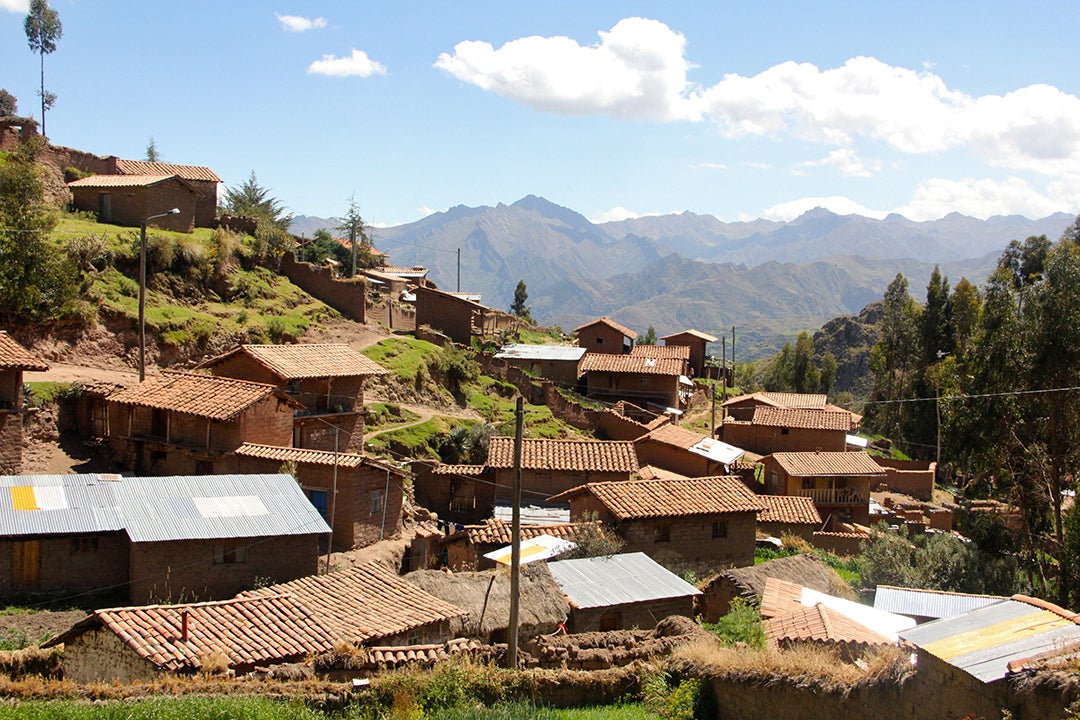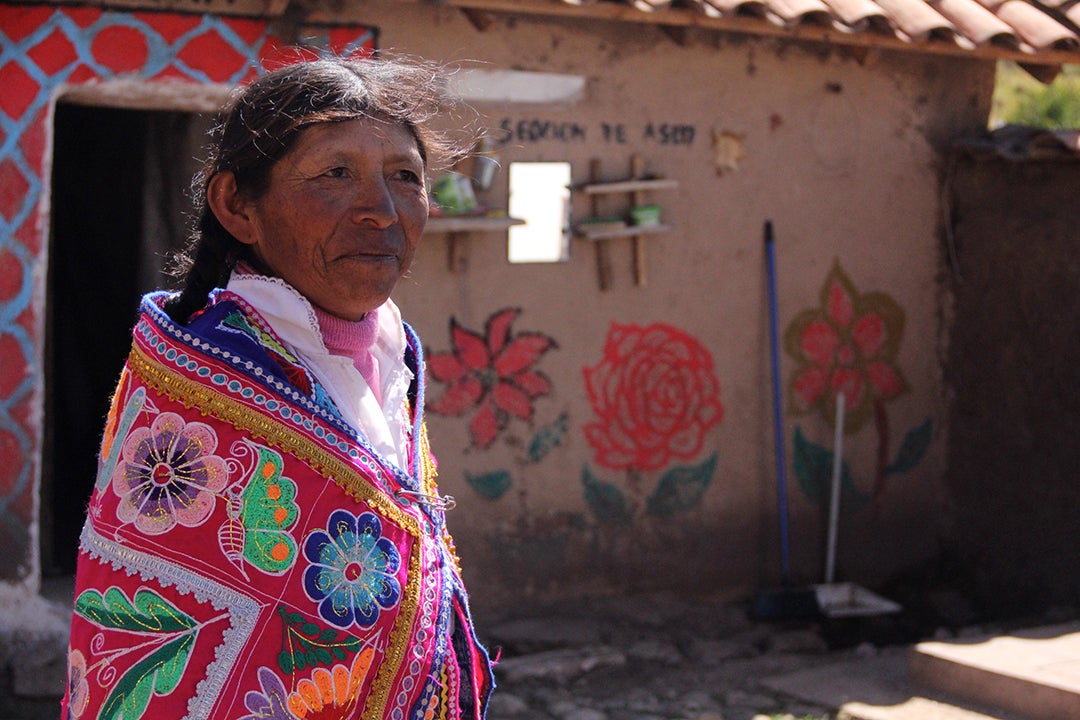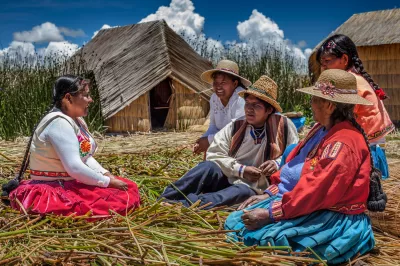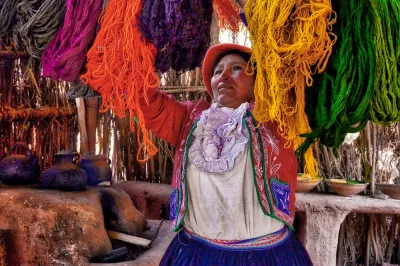Improving the Lives of the Poorest in Peru
This April, we visited the Peru Graduation Pilot, one of the 10 sites of the CGAP-Ford Foundation Graduation Program, a global effort to understand how safety nets, livelihoods and access to finance can be sequenced to create sustainable pathways for the poorest out of extreme poverty. The Peru Graduation Pilot is a 24-month project being implemented in 80 communities with the purpose of improving the living conditions of the poorest. In the high altitude and indigenous region of Cusco, we visited several communities that benefitted from the project. Beatriz was one of many women we encountered during our two-day field visit. Joined by members of the Pilot’s Steering Committee, we sat on the floor of her kitchen as she proudly showed off her newly improved oven, one of many improvements that have been made to her home and to her life over the last two years.
Beatriz lives in a small village of Cochapata, in the high Andean region over 5 hours drive from Cusco. Distance and language barriers are just two of the many obstacles preventing the extreme poor from being able to participate in Peru’s growing economy. Though set against a stunning landscape, these areas have been characterized by high degrees of malnourishment among children, alcoholism and violence. Over the past two years, however, the changes among the families who participated in the Peru Graduation Pilot have been tremendous.
 A mountainous landscape in Peru.
A mountainous landscape in Peru.
Photo Credit: Michael Rizzo. View the photo gallery >>
The Graduation Approach is meant to be a ladder for the poorest out of extreme poverty. CGAP and the Ford Foundation are working in partnership with local organizations to implement ten Graduation Pilots in eight countries. The implementing partners are usually one NGO for the livelihood support and one MFI for linking the program participants to basic savings services. The program also involves rigorous impact evaluations using both quantitative and qualitative research at most sites. In Peru, the implementing partners are Plan International and Arariwa. Innovations for Poverty Action conducts the randomized control trial (RCT) of the program accompanied by a qualitative study.
Beatriz continued to show us some of the improvements to her property, leading us to her newly constructed stable which houses her cuy (guinea pig). Like many other program participants, Beatriz has chosen cuy breeding out of the various productive assets the project provides, including dairy production, cattle raising and crafting. Cuy is considered to be a delicacy and a single guinea pig can be sold easily for 20 Soles (about $7). Beatriz saves 10 Soles ($3.50) of her earnings each month in a saving group with some of her neighbors which was initiated by the program. Eighty-six percent of program participants save in some form, but only 50% of participants are semi-formally part of savings groups. Members of Arariwa, the microfinance institution, say this boils down to trust, and that families in the region do not trust banks.

Photo Credit: Michael Rizzo. View the photo gallery >>
The livelihoods training and financial services component provided by Plan and Arariwa have already proven to benefit the families participating in the pilot. Preliminary results of IPA’s research indicate that most of the participating families were able to improve their incomes. What we witnessed from visiting the families, however, was that the most profound impact the program has had is non-material. Plan and Arariwa’s support through social work and health services have had a positive influence on family dynamics by addressing issues such as how to manage anger, how adults can relate better to their children and how to improve household decision-making. Furthermore, the weekly visits for the livelihood training by PLAN staff and the regular visits by qualitative researchers have given the families the opportunity to reflect on their lives. Mariella Greco, Director of Plan International in Peru, told us that what the families speak about during visits from Plan staff is not the subsidies provided, but rather about how the program provides guidance on how to change their life. “From the beginning, they said ‘someone is going to be with me, someone is going to help.’ That has been one of the more moving and strongest features of this pilot design,” says Greco.
The positive impact of the program is not isolated to the Peru Pilot. Both the quantitative and qualitative research from other sites such as Haiti and Bangladesh demonstrated the program to be effective in promoting sustainable livelihoods and family transformation. Frank DeGiovanni, Director of the Financial Assets unit of Ford Foundation, recognizes that the hope has always been to scale up if the model works. “We’re seeing that this program has been effective, that the treatment groups have benefited more than the control families, so we are now beginning an active advocacy and communications campaign to convince donors and governments to integrate this model into their social protection programs,” says DeGiovanni.
Although the results of the formal impact evaluations will only be available later this year, Beatriz exemplifies that the Graduation Pilot in Peru is one that works in promoting sustainable livelihoods and family transformation. “I feel more love for my children. The program taught me to count to ten if I feel angry and that’s what I do. I count to ten and then I go out and take care of my animals. We eat animal protein once every week and my husband doesn’t have to migrate anymore which makes the whole family happier,” says Beatriz. “This program changed my life.”




Comments
This is really a good news
This is really a good news for poor people in Peru and else where in the World where the pilot project will extend because population increased their livelihoods economically as their income go up but above all morally and socially because they control anger and crimes are reduced.
Add new comment